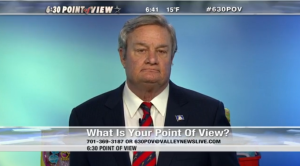NY Times is biased, ND governor says, so he won’t comment

By Rob Port | Watchdog.org North Dakota Bureau
TOO BIASED: North Dakota Governor Jack Dalrymple, a Republican, says he wouldn’t agree to an interview with the New York Times because the paper is too biased.
FARGO, N.D. — When New York Times reporters came to North Dakota to cover the oil boom, they never got to speak with Gov. Jack Dalrymple.
Dalrymple, a Republican, says he won’t talk to the paper because it’s biased.
“Every once in a while you get into a situation where it’s obvious the treatment is not going to be fair, it’s not going to be balanced, the agenda is already there,” Dalrymple told Valley News Live anchor Chris Berg in an interview. “I think in that situation there’s not much you can do about it. We continue to communicate every day in North Dakota about the things we’re doing to manage our growth and development. The truth will win out.”
In North Dakota, the governor serves on the state’s Industrial Commission, which oversees the regulation of oil and gas development. The Times article was sharply critical of Dalrymple’s handling of oil and gas regulations, noting the state often waives large portions of fines for the industry and that Dalrymple has taken large political contributions from oil and gas interests.
Dalrymple’s office offered a written statement but wouldn’t grant an interview.
In his budget address to the Legislature, Dalrymple has called for new funding for oversight of the energy industry. His budget, which would represent roughly $2 billion in additional spending from the previous biennium, includes 19 new positions in the state Department of Health and 22 new positions in the Oil and Gas Division.
Dalrymple said this new spending is not about playing catchup with the oil boom but about keeping up with growth. “I think we are on the curve,” he said. “We are following the growth as it occurs. As we look back over the last few years, I think we’ve been on the mark, and looking ahead we are going to stay up with it across the board.”
He also addressed regulators’ waiving fines for oil industry companies involved in spills and other infractions, a centerpiece of the Times critique. Dalrymple said the waived fines serve as incentive for companies to follow the law.
“The fine system that we use in our oil and gas division is designed to modify people’s behavior, to modify the behavior of the companies,” he said. “I think generally speaking their policy is if a company completely corrects and completely pays for a situation according to our request they will be rewarded by having a fine go down. That doesn’t read very well in the newspaper when you say a fine was cut down, but they did a lot and spent a lot of money in exchange for performing properly. That is our strategy for getting companies to do the right thing.”







